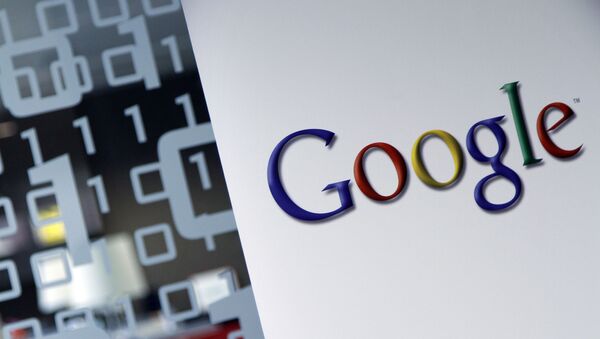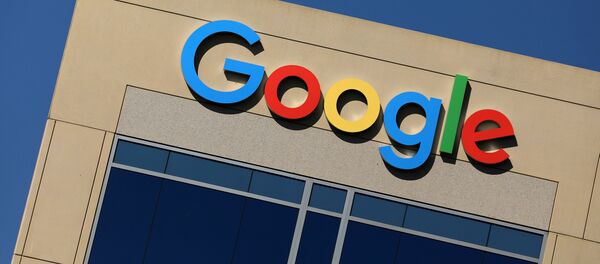'N****r House' Search in Google Maps Leads People to Obama’s White House
The year 2015 was quite rich in embarrassing racism controversies: the tech company had to apologize after discovering that certain searches in Google Maps containing the racist slur “n****r” directed users to the White House.
READ MORE: 'F**k Off Google': Berlin 'Occupy' Branch Protests Against Tech Giant’s Campus
When users searched for “n****r house” and “n****r king” when in the Washington DC greater area, the map pinpointed the home of then-President Barack Obama.
In separate cases, results showed the historically black Howard University or a Waffle House location.
Google Photos Tag Black Couple as 'Gorillas'
Just a month after the Google Maps blunder, the company found itself in yet another racism-related scandal. A software engineer of African descent, Jacky Alciné, took to Twitter to point out that the image recognition algorithms in Google’s new Photos feature kept tagging snaps of him and his friend as “gorillas.”
Google Photos, y'all fucked up. My friend's not a gorilla. pic.twitter.com/SMkMCsNVX4
— Jacky lives on @jalcine@playvicious.social now. (@jackyalcine) 29 июня 2015 г.
What kind of sample image data you collected that would result in this son?
— Jacky lives on @jalcine@playvicious.social now. (@jackyalcine) 29 июня 2015 г.
And it's only photos I have with her it's doing this with (results truncated b/c personal): pic.twitter.com/h7MTXd3wgo
— Jacky lives on @jalcine@playvicious.social now. (@jackyalcine) 29 июня 2015 г.
Google responded by saying that it was “appalled” and “genuinely sorry” for the mistake:
"We're appalled and genuinely sorry that this happened," a spokeswoman told the BBC. “We are taking immediate action to prevent this type of result from appearing. There is still clearly a lot of work to do with automatic image labelling, and we're looking at how we can prevent these types of mistakes from happening in the future."
Two years later, the search engine simply censored “gorilla,” “monkey,” “chimp” and “chimpanzee” from the lexicon of labels the image classifier can apply, rendering these animals in some sense unsearchable and invisible.
Is Google Manipulating Search Results?
It seems that the whole world was into the 2016 presidential campaign in the US, and Google was no exception. At the time, Google was accused of manipulating search results to benefit Hillary Clinton’s candidacy, based on autocomplete suggestions – the theory, which was bluntly laid out by her Republican opponent, Donald Trump, who alleged that the search engine was suppressing search results that would paint the Democratic candidate in a bad light.
READ MORE: Google Staff Panicked After Trump Victory, Pledged to Fight Agenda
A viral video by SourceFed showed a number of examples of autocomplete results, including one for "Hillary Clinton cri" that included "Hillary Clinton crime reform," "Hillary Clinton crisis," and "Hillary Clinton crime bill 1994," but not "Hillary Clinton criminal."
But the Clinton case is not the only time that Google has been suspected of tweaking search-related functions. The most recent leak of internal company emails, obtained by the Wall Street Journal, showed that employees discussed ways by which they might be able to alter search results at the height of the Trump administration’s travel ban in January 2017.
They suggested using the company’s influence to challenge Trump’s travel ban and proposed a number of steps to counter what they deemed to be “islamophobic, algorithmically biased results from search terms ‘Islam,’ ‘Muslim,’ ‘Iran’,” and “prejudiced, algorithmically biased search results from search terms ‘Mexico,’ ‘Hispanic,’ ‘Latino,’ etc.”
READ MORE: Google Staff Discussed Manipulating Search Results to Oppose Trump’s Travel Ban
Once the emails were unearthed, the company’s spokeswoman responded by saying that they “were just a brainstorm of ideas, none of which were ever implemented.”
“Google has never manipulated its search results or modified any of its products to promote a particular political ideology—not in the current campaign season, not during the 2016 election, and not in the aftermath of President Trump’s executive order on immigration. Our processes and policies would not have allowed for any manipulation of search results to promote political ideologies,” she emphasized.
Fired Anti-Diversity Employee Files Class Action for Discrimination
Even though Google claimed that it hadn’t manipulated results, allegedly steering clear of politics, it didn’t prevent them from being sued for discrimination against “white, male conservative employees.”
READ MORE: 'This Is a Major Issue, Because Google’s Got a Huge Amount of Power' – Expert
As the year 2018 kicked off, James Damore, a former engineer at Google, filed a class action lawsuit against the company, claiming that it had unfairly discriminated against white men whose political views were unpopular with the majority.
Damore, who was sacked in 2017 after posting an anti-diversity memo to an internal Google message board arguing that men may be more capable of working in tech than women, claimed that white, male conservative employees were “ostracized, belittled, and punished.”
In response, Google sought a protective order against the plaintiff to prevent future legal submissions from employees who were not involved in the lawsuit, with the tech mammoth saying that screenshots of employee reviews in Damore’s suit had led to doxing – leaking of online private or identifiable information about workers or the organization.
EU Seeks to Fine Google for Abusing Android Market Dominance
The class action suit was not the last big problem to hit the tech giant: in July 2018, EU regulators slapped Google with a hefty €4.3 billion ($5 billion) fine for breaching antitrust laws. According to the European Commission, Google had been trying to cement its dominance by imposing illegal restrictions on Android device manufacturers in three key areas.
Fine of €4,34 bn to @Google for 3 types of illegal restrictions on the use of Android. In this way it has cemented the dominance of its search engine. Denying rivals a chance to innovate and compete on the merits. It’s illegal under EU antitrust rules. @Google now has to stop it
— Margrethe Vestager (@vestager) 18 июля 2018 г.
The company had required them to pre-install its search and browser apps as a condition for licensing the Play Store; it had “made payments to certain large manufacturers and mobile network operators” to exclusively install the Google search app; and it blocked phone makers from creating devices running on alternative versions of Android that were not approved by Google.
READ MORE: About 25% of World's National Elections Are Determined by Google – Expert
The tech giant, however, is determined to appeal the decision.
Popular Brands Pull Ads From Google’s YouTube
In March 2017, Google came under fire after its automated system placed ads for some of the most renowned brands, including Coca-Cola, Amazon, Microsoft, Procter & Gamble, etc. alongside extremist or offensive content on YouTube.
READ MORE: Google's Chrome Update Makes it Easier to Track Your Data
After brands pulled their ads, Google’s chief business officer, Philipp Schindler, apologized on behalf of the company and wrote that they were “taking a tougher stance on hateful, offensive and derogatory content.”




